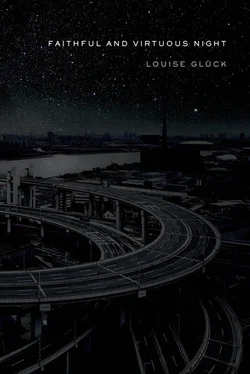He worked by preference in a room without clocks, trusting the light to tell him when the day was finished. In summer, he liked the window open. How then, in summer, did the winter wind enter the room? You are right, he cried out to the wind, this is what I have lacked, this decisiveness and abruptness, this surprise — O, if I could do this I would be a god! And he lay on the cold floor of the study watching the wind stirring the pages, mixing the written and unwritten, the end among them.
I had an assistant, but he was melancholy,
so melancholy it interfered with his duties.
He was to open my letters, which were few,
and answer those that required answers,
leaving a space at the bottom for my signature.
And under my signature, his own initials,
in which formality, at the outset, he took great pride.
When the phone rang, he was to say
his employer was at the moment occupied,
and offer to convey a message.
After several months, he came to me.
Master, he said (which was his name for me),
I have become useless to you; you must turn me out.
And I saw that he had packed his bags
and was prepared to go, though it was night
and the snow was falling. My heart went out to him.
Well, I said, if you cannot perform these few duties,
what can you do? And he pointed to his eyes,
which were full of tears. I can weep, he said.
Then you must weep for me, I told him,
as Christ wept for mankind.
Still he was hesitant.
Your life is enviable, he said;
what must I think of when I cry?
And I told him of the emptiness of my days,
and of time, which was running out,
and of the meaninglessness of my achievement,
and as I spoke I had the odd sensation
of once more feeling something
for another human being—
He stood completely still.
I had lit a small fire in the fireplace;
I remember hearing the contented murmurs of the dying logs—
Master, he said, you have given
meaning to my suffering.
It was a strange moment.
The whole exchange seemed both deeply fraudulent
and profoundly true, as though such words as emptiness and meaninglessness
had stimulated some remembered emotion
which now attached itself to this occasion and person.
His face was radiant. His tears glinted
red and gold in the firelight.
Then he was gone.
Outside the snow was falling,
the landscape changing into a series
of bland generalizations
marked here and there with enigmatic
shapes where the snow had drifted.
The street was white, the various trees were white—
Changes of the surface, but is that not really
all we ever see?
I found the stairs somewhat more difficult than I had expected and so I sat down, so to speak, in the middle of the journey. Because there was a large window opposite the railing, I was able to entertain myself with the little dramas and comedies of the street outside, though no one I knew passed by, no one, certainly, who could have assisted me. Nor were the stairs themselves in use, as far as I could see. You must get up, my lad, I told myself. Since this seemed suddenly impossible, I did the next best thing: I prepared to sleep, my head and arms on the stair above, my body crouched below. Sometime after this, a little girl appeared at the top of the staircase, holding the hand of an elderly woman. Grandmother, cried the little girl, there is a dead man on the staircase! We must let him sleep, said the grandmother. We must walk quietly by. He is at that point in life at which neither returning to the beginning nor advancing to the end seems bearable; therefore, he has decided to stop, here, in the midst of things, though this makes him an obstacle to others, such as ourselves. But we must not give up hope; in my own life, she continued, there was such a time, though that was long ago. And here, she let her granddaughter walk in front of her so they could pass me without disturbing me.
I would have liked to hear the whole of her story, since she seemed, as she passed by, a vigorous woman, ready to take pleasure in life, and at the same time forthright, without illusions. But soon their voices faded into whispers, or they were far away. Will we see him when we return, the child murmured. He will be long gone by then, said her grandmother, he will have finished climbing up or down, as the case may be. Then I will say goodbye now, said the little girl. And she knelt below me, chanting a prayer I recognized as the Hebrew prayer for the dead. Sir, she whispered, my grandmother tells me you are not dead, but I thought perhaps this would soothe you in your terrors, and I will not be here to sing it at the right time.
When you hear this again, she said, perhaps the words will be less intimidating, if you remember how you first heard them, in the voice of a little girl.
One morning I awoke unable to move my right arm.
I had, periodically, suffered from considerable
pain on that side, in my painting arm,
but in this instance there was no pain.
Indeed, there was no feeling.
My doctor arrived within the hour.
There was immediately the question of other doctors,
various tests, procedures—
I sent the doctor away
and instead hired the secretary who transcribes these notes,
whose skills, I am assured, are adequate to my needs.
He sits beside the bed with his head down,
possibly to avoid being described.
So we begin. There is a sense
of gaiety in the air,
as though birds were singing.
Through the open window come gusts of sweet scented air.
My birthday (I remember) is fast approaching.
Perhaps the two great moments will collide
and I will see my selves meet, coming and going—
Of course, much of my original self
is already dead, so a ghost would be forced
to embrace a mutilation.
The sky, alas, is still far away,
not really visible from the bed.
It exists now as a remote hypothesis,
a place of freedom utterly unconstrained by reality.
I find myself imagining the triumphs of old age,
immaculate, visionary drawings
made with my left hand—
“left,” also, as “remaining.”
The window is closed. Silence again, multiplied.
And in my right arm, all feeling departed.
As when the stewardess announces the conclusion
of the audio portion of one’s in-flight service.
Feeling has departed —it occurs to me
this would make a fine headstone.
But I was wrong to suggest
this has occurred before.
In fact, I have been hounded by feeling;
it is the gift of expression
that has so often failed me.
Failed me, tormented me, virtually all my life.
The secretary lifts his head,
filled with the abstract deference
the approach of death inspires.
It cannot help, really, but be thrilling,
this emerging of shape from chaos.
A machine, I see, has been installed by my bed
to inform my visitors
of my progress toward the horizon.
My own gaze keeps drifting toward it,
the unstable line gently
ascending, descending,
like a human voice in a lullaby.
And then the voice grows still.
At which point my soul will have merged
with the infinite, which is represented
by a straight line,
like a minus sign.
I have no heirs
in the sense that I have nothing of substance
to leave behind.
Possibly time will revise this disappointment.
Those who know me well will find no news here;
Читать дальше












